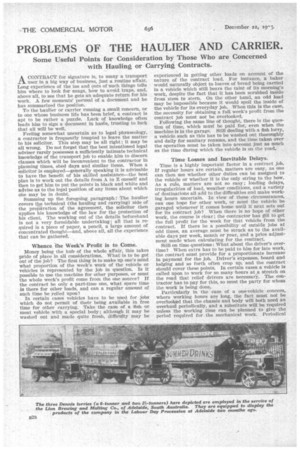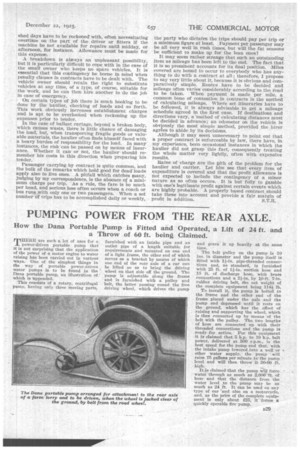PROBLEMS OF THE HAULIER AND CARRIER.
Page 14

Page 15

If you've noticed an error in this article please click here to report it so we can fix it.
Some Useful Points for Consideration by Those Who are Concerned with Hauling or Carrying Contracts.
ACONTRACT for signature is, to many a transport user in a big way of business, just a routine affair. Long experience of the ins and outs of such things tells him where to look for snags, how to avoid traps, and,
above all, to see that he gets an adequate return for his work A few moments' perusal of a document and he has summarized the position.
To the haulier or carrier running a small concern, or to one whose business life has been brief, a contract is apt to be rather a puzzle. Lack of knowledge often leads him to sign a document in haste, trusting to luck that all will be well.
Feeling somewhat uncertain as to legal phraseology, a contractor is frequently tempted to leave the matter to his solicitor. This step may be all right ; it may be all wrong. Do not forget that the best intentioned legal adviser rarely possesses a sufficiently intimate technical knowledge of the transport job to enable him to discern clauses which will be inconvenient to the contractor in planning times, shed days and similar items. When a solicitor is employed—generally speaking it is advisable to have the benefit of his skilled assistance—the best plan is to work out the details from A to Z oneself and then to get him to put the points in black and white and advise as to the legal position of any items about which one may be in doubt.
Summing up the foregoing paragraph: The haulier covers the technical (the hauling and carrying) side of the preparation of the agreement, the solicitor then applies his knowledge of the law for the protection of his client. The working out of the details beforehand is not a very formidable undertaking; all that is required is a piece of paper, a pencil, a large amount of concentrated thought—and, above all, all the experience that can be gathered.
Whence The Week's Profit is to Come.
Money being the hub of the whole affair, this takes pride of place in all considerations. What is to be got out of the job? The first thing is to make up one's mind what proportion of the week's work of the vehicle or vehicles is represented by the job in question. Is it possible to use the machine for other purposes, or must the whole week's profit come from the one source? If the contract be only a part-time one, what spare time is there for other loads, and can a regular amount of such time be relied upon?
In certain cases vehicles have to be used for jobs which do not permit of their being available in free time for other carrying. Take the case of a fish or meat vehicle with a special body ; although it may be washed out and made quite fresh, difficulty may be
experienced in getting other loads on account of the nature of the contract load, For instance, a baker would naturally object to loaves of bread being carried in a vehicle which still bears the taint of its morning's work, despite the fact that it has been scrubbed inside from stem to stern. On the other hand, an odd load may be impossible because it would spoil the inside of the vehicle for its everyday job. When this is the case, the necessity for obtaining a full week's profit from the contract job must not be overlooked.
Following the same line of thought, there is the question of time, which must be paid for, even when the machine is in the garage. Still dealing with a fish lorry, a vehicle such as this has to be washed out thoroughly and daily for sanitary reasons, and the time taken overthe operation must be taken into account just as much as the time dltring which the vehicle is on the road.
Time Losses and Inevitable Delays.
Time is a highly important factor in a contract job. If regular hours are certain, matters are easy, as one can then see whether other duties can be assigned to the vehicle or whether it is the only string to the bow. As a rule, matters are not so easy ; loading delays, irregularities of load, weather conditions, and a variety of destinations all add to the difficulties and make working hours uncertain. In view of these circumstances, can one hope for other work, or must the vehicle be garaged whenever it comes home until it next sets out for its contract job? When there is no hope of other work, the course is clear ; the contractor has got to get the full profit for the week for that vehicle from the contract. If there be a possibility of outside jobs at odd times, an average must be struck as to the available days per week, month or year, and a price adjustment made when calculating for the contract.
Still on time questions : What about the driver's overtime? When extra has to be paid to him for late work, the contract must provide for a proportionate increase in payment for the job. Driver's expenses, board and lodging and so forth often crop up, and the contract should cover these points. In certain cases a vehicle is called upon to work for so many hours at a stretch on the road that relief drivers are necessarSr. The contractor has to pay for this, so must the party for whom the work is being done.
Particularly in the case of a one-vehicle concern, where working hours are long, the fact must not be overlooked that the chassis and body will both need an overhaul periodically, and a substitute will be required unless the working time can be planned to give the period required for the mechanical work. Periodical shed days have to be reckoned' with, often necessitating overtime on the part of the driver or fitters if the machine be not available for repairs until midday, or afternoon, for instance. Allowance must be made for this expense.
A breakdown is always an unpleasant possibility, but it is particularly difficult to cope with in the case of the small owner who keeps no spare vehicles. It is essential that this contingency be borne in mind when penalty clauses in contracts have to be dealt with. The vehicle owner should retain the right to substitute vehicles at any time, of a type, of course, suitable for the work, and he can then hire another to do the job in case of emergency.
On certain types of job there is much booking to be done by the haulier, checking of loads and so forth. This work obviously increases establishment charges and is apt to be overlooked when reckoning up the expenses prior to tender.
In the case of ballast cartage, beyond a broken body, which causes waste, there is little chance of damaging the load, but, when transporting fragile goods or valuable materials, the haulier often finds himself faced with a heavy burden of responsibility for the load. In many instances, the risk can be passed on by means of insurance. Whether It can or not, the haulier should remember his costs in this direction when preparing his tender.
Passenger carrying by contract is quite common, and the bulk of the remarks which hold good for dead loads apply also to live ones. A pitfall which catches many, judging by my correspondence, is the absence of 3:minimum charge per trip. As a rule, the fare is so much per head, and serious loss often occurs when a coach or bus runs with only one or two passengers. When a set number of trips has to be accomplished daily or weekly, the party who dictates the trips should pay per trip or a minimum figure at least. Payment per passenger may be all very well in rush times, but will the fat seasons be sufficient to make up for the lean ones?
It may seem rather strange that such an outstanding item as mileage has been left to the end. The fact that it is so prominent accounts for its final position. Miles covered are bound to occur to everybody who has anything to do with a contract at all; therefore, I propose to say very little about it, because it is obvious and Comparatively simple. Routes have to be decided and mileage often varies considerably according to the. road to be taken. When payment is made per mile, a common bone of contention in contracts is the method of calculating mileage. Where set itineraries have to be followed, it is always advisable to get a mileage schedule agreed in the first case. If destinations and directions vary, &method of calculating distances must be decided in advance; an odometer on the vehicle is obviously the most simple method, provided the hirer agrees to abide by its decisions.
Although it may seem unnecessary to point out that a proper contract is enforceable by law, there bare, in my experience, been occasional instances in which the hardier did not grasp this fact, consequently treating the whole matter very lightly, often with expensive results.
Rates of charge are the pith of the problem for the haulier and carrier. Let him see that every item of expenditure is covered and that the profit allowance is not expected to include the contingency of a minor nature as so often occurs. It is but folly to gamble with one's legitimate profit against certain events which are highly probable. A properly based contract should take these into account and provide a fair margin of profit in addition. S.T.R.






























